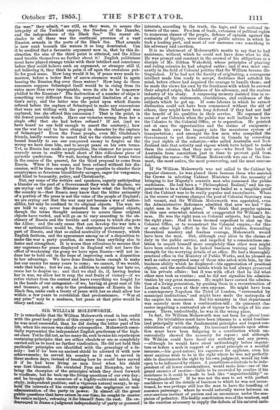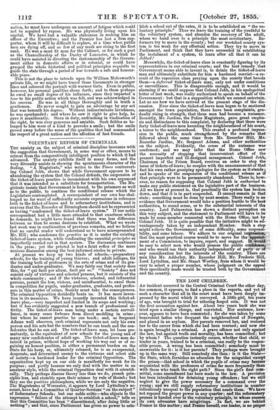SIR WILLIAM MOLESWOILTH.
IT is remarkable that Sir William Molesworth stood in less credit with the great body politic of this country some years. back, when he was most successful, than he did during the latter part of his life, when his success was chiefly. retrospective. Molesworth essen- tially represented the independentEnglish gentleman of the high. eat class. Yet he did not, as too many do, seek to raise his repute upon sustaining principles that are either obsolete or- are so completely carried out as to need no further vindication. Ile did not hold that particular principles are identified with the genealogy of a fn mily : but if he bore an ancient shield he adorned it with new achievements ; he served his country as it can be served in these modern days, instead of boasting how he would have served it if he had been living as men lived when his shield. was first blazoned. He emulated Pym and. Hampden, not by being the champion of the principles which they stood forward to vindicate, but he took up the living questions of our own day; and he brought the resources of a highly-cultivated mind, long study, independent position; and a vigorous natural energy, to up- hold the interests of his- country against the negligence or mal- administration of the party in power. In almost all the great public questions that have arisen in our time, he sought to master, the entire subject, retracing it for himself from its root. He en- deavoured to frame a judgment independently of party or personal
interests, according to the truth, the lbgio, and the national' in- terests of the case. Freedom of trade„extension of political rights to numerous classes of' the people, defence ot opinion against the, restraints of bigotry, were classes of public service in which he took a leading part, and most of our successes owe something to his advocacy and exertion.
It is no abatement of Molesworth's merits to say that he had assistance, without which he could not have done what he did: He was prompt and constant in the avowal of his obligations as a disciple of Mr; Gibbon Wakefield, whose principles of planting and ruling colonies he had adopted entire ; and it was most emi- nently in the field of Colonial politics that Sir William became dis- tinguished. If he had not the faculty of originating, a courageous intellect made him ready to accept, doctrines that satisfied his mind, before others had acquired the courage to handle them ; and he made the views his own by the frankness with which he avowed' their adopted origin, the boldness of his advocacy, and the zealous industry of his study. A surpassing memory assisted him in' re- producing all the statements, elucidations, and evidences of the subjects which he got up. If some labours in which he earned distinction could not have been commenced without the aid of' others they might have been long deferred if they had not bad the benefit of his qualities in their service. He espoused' the" cause of our Colonies when the public was well inclined to leave the Colonies to the Colonial Office, or to separation: He pointe& out at once the opportunities and the claims of emigrants.; he made his own the inquiry into the monstrous system' of transportation ; and. amongst the few men who compelled the Government to put down revolution in Canada by conceding the just rights of the colonists—who called Australia and New. Zealand into that activity and vigour which _have helped to make them the colonies that they now are—who. freed the lands of Australia from convictism just in time to prevent gold from doubling the curse—Sir -William Molesworth was one of the fore- most, the. moat aotive, the most persevering, and the most success, fuL
If Sir William. Molesworth was not called to the Cabinet by popular clamour, he Was placed there because those who assisted
the Crown in selecting Cabinet Ministers felt the necessity of bringing to her Majesty's councils men who possessed the public. confidence. He had been a "Philosophical Radical," and his ap- pointment to. be a Cabinet Minister was-hailed as a tangible-proof that the Cabinet was to. be really popular and tine/elusive. Whom in the course of various changes the postof Colonial Secretary, was left vacant, and Sir William Molesworth was appointed,, even the Administrative Reformers admitted that now we had "the, right man in the right place." We think that popular opiniont in this case somewhat mistook or exaggerated Sir William's fit,-- nem. He was the right man. on Colonial subjects, but hardly int the right place.. Had it been deemed expedient to shut up, the Colonial Office, or to reconstruct the Colonial empire,—for this or any other high effort in the line of his studies, demanding- theoretioal mastery and fearless courage, Molesworth woul& have been the man. But, although ever alive to the claims. of duty in the public service, and impelled by a conscientious ame bition to acquit himself' more completely than other men might have been content to do, he lacked business training and bodily strength. for the worrying details of an office. He had a thoroughly practical office in the Ministry of Public Works, and he pleased, as. well as rather surprised some of those who acted with him, by the business ability which he. displayed—his appreciation of practical_ objects, and the, methodical .habits which he had always preserved' in his private affairs : but it was with effort that he did what. other men took as routine ; and he did not signalize his adminis- tration by, any great measure. He might have earned the admire,. tion of a living generation, by guiding them in a reconstruction of London itself, even at their own expense. He might have been. a contemporary Napoleon the Third of -London, "surrounded by municipal institutions," and might have made the metropolis of the empire his monument. But his ministry in that department was scarcely more than a continuation-bill ; its quiescent cha- racter imparting a contrasted air of vigour to' the reign of his suc- cessor: There, undoubtedly, he was in the wrong place.
In fact, Sir William Molesworth was not born, for official busi- ness. Its trivialitieiemust have been irksome to a mind familiar,. ized principally with the fundamental principles. and largest con- siderations of statesmanship. Its incessant demands upon Wane tion must have been fatiguing to a constitution which tui- concealedly showed the necessity for repose ; and althought Sir William could have faced any authority and any power, —although he would have stood unflinchingly before inquisi- tors or before a mob in support of a great principle or a needfat measure,—his good-nature, his eagerness for applause, even his most anxious wish to be in the right where he was not perfectly. able to disoriminatethe right by his own judgment, would lay him. open to be influenced by others. A punctilious solicitude to be nide..
pendent of all lower considerations, would make him—one of, the, grand enemies of routine—liable to be overruled by routine if hie resistance to it could be made to look like "impracticability," or,
"wrongheadedness." If he was not the man to act with perfect confidence in all the details of business to which he was not accus- tomed, he was perhaps still less the man to have the handling of
common patronage ; where he would naturally waver between an overeurxious instinct of purism and an uneasiness under the sus- picion of pedantry. His bodily constitution was of the weakest, an& in the exertion necessary to supply the-defects of ha, natural inch-
nation, he must have undergone an amount of fatigue which could not be repaired by repose. He was physically living upon his capital. We have lost a valuable statesman in making him an officer of the Executive ; and the Premier has lost a firm sup- porter, whom it will be difficult to replace, at a time when public men are dying off, and so few of any mark are rising to the first rank. He was a most fit man for the Cabinet, or for such a post as the Chancellorship of the Duchy of Lancaster, in which he could have assisted in directing the statesmanship of the Govern- ment either in domestic affairs or in colonial, or could have grasped the whole historical and political principles requisite to guide the state through a period of war towards a safe and honour- able. peace. This is not the place to intrude upon Sir William Molesworth's private life, or we might have traced these lineaments in stronger lines and coloured the portrait with warmer tints. Even in public, however, his personal qualities shone forth; and to them perhaps he owed no small degree of his influence, since they imparted a tone to his public action which was felt, and was acknowledged in his success. He was in all things thoroughly and in truth a gentleman. He never sought to gain an advantage by any act that was beneath his degree. Without indiscriminate lavishness, he was openhanded ; and where he saw it right to give help, he gave it munificently. Stern in duty, unflinching in vindication of the right, he was ever generous and amiable. Such foibles as be- longed to him were of a kind to provoke a smile ; but the smile passed away before the sense of the qualities that had commanded the respect of a great nation and the affection of fast friends.



























 Previous page
Previous page